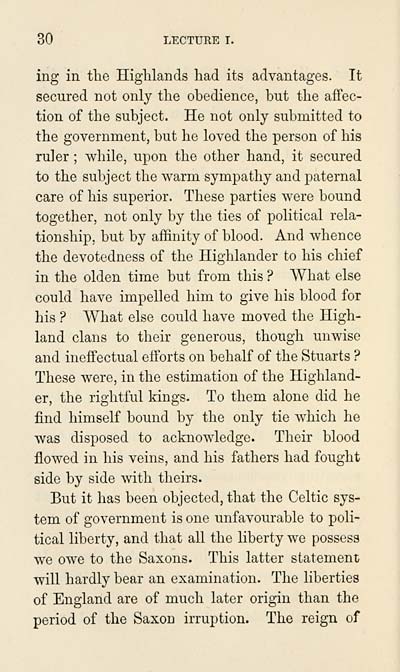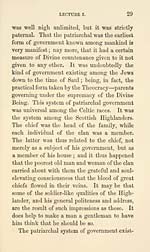Blair Collection > Celtic gleanings, or, Notices of the history and literature of the Scottish Gael
(42)
Download files
Complete book:
Individual page:
Thumbnail gallery: Grid view | List view

30 LECTURE I.
ing in the Highlands had its advantages. It
secured not only the obedience, but the affec-
tion of the subject. He not only submitted to
the government, but he loved the person of his
ruler ; while, upon the other hand, it secured
to the subject the warm sympathy and paternal
care of his superior. These parties were bound
together, not only by the ties of political rela-
tionship, but by affinity of blood. And whence
the devotedness of the Highlander to his chief
in the olden time but from this ? What else
could have impelled him to give his blood for
his ? What else could have moved the High-
land clans to their generous, though unwise
and ineffectual efforts on behalf of the Stuarts ?
These were, in the estimation of the Highland-
er, the rightful kings. To them alone did he
find himself bound by the only tie which he
was disposed to acknowledge. Their blood
flowed in his veins, and his fathers had fought
side by side with theirs.
But it has been objected, that the Celtic sys-
tem of government is one unfavourable to poli-
tical liberty, and that all the liberty we possess
we owe to the Saxons. This latter statement
will hardly bear an examination. The liberties
of England are of much later origin than the
period of the Saxon irruption. The reign of
ing in the Highlands had its advantages. It
secured not only the obedience, but the affec-
tion of the subject. He not only submitted to
the government, but he loved the person of his
ruler ; while, upon the other hand, it secured
to the subject the warm sympathy and paternal
care of his superior. These parties were bound
together, not only by the ties of political rela-
tionship, but by affinity of blood. And whence
the devotedness of the Highlander to his chief
in the olden time but from this ? What else
could have impelled him to give his blood for
his ? What else could have moved the High-
land clans to their generous, though unwise
and ineffectual efforts on behalf of the Stuarts ?
These were, in the estimation of the Highland-
er, the rightful kings. To them alone did he
find himself bound by the only tie which he
was disposed to acknowledge. Their blood
flowed in his veins, and his fathers had fought
side by side with theirs.
But it has been objected, that the Celtic sys-
tem of government is one unfavourable to poli-
tical liberty, and that all the liberty we possess
we owe to the Saxons. This latter statement
will hardly bear an examination. The liberties
of England are of much later origin than the
period of the Saxon irruption. The reign of
Set display mode to: Large image | Transcription
Images and transcriptions on this page, including medium image downloads, may be used under the Creative Commons Attribution 4.0 International Licence unless otherwise stated. ![]()
| Early Gaelic Book Collections > Blair Collection > Celtic gleanings, or, Notices of the history and literature of the Scottish Gael > (42) |
|---|
| Permanent URL | https://digital.nls.uk/76269206 |
|---|
| Description | A selection of books from a collection of more than 500 titles, mostly on religious and literary topics. Also includes some material dealing with other Celtic languages and societies. Collection created towards the end of the 19th century by Lady Evelyn Stewart Murray. |
|---|
| Description | Selected items from five 'Special and Named Printed Collections'. Includes books in Gaelic and other Celtic languages, works about the Gaels, their languages, literature, culture and history. |
|---|

